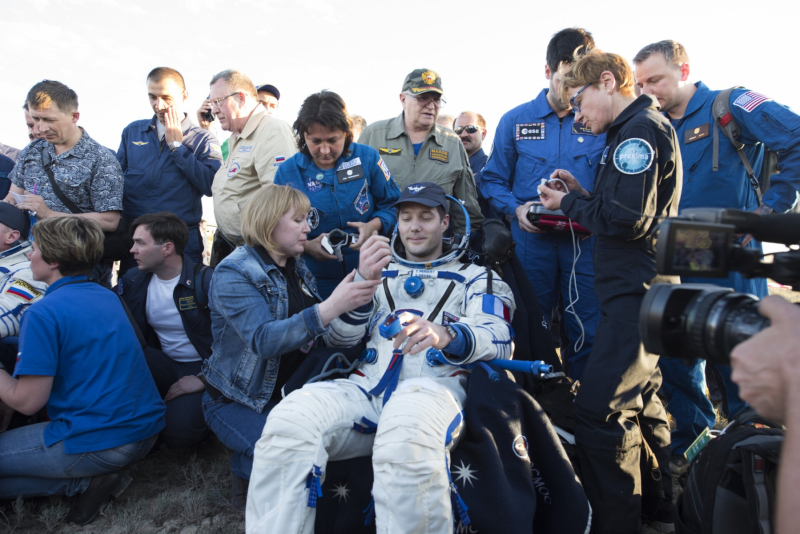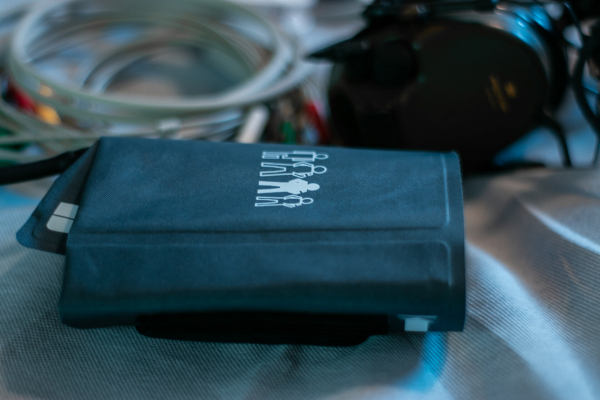HydroScan
Diestsesteenweg 104A
3010 Leuven
Belgium
Telemedicine on the frontline in Spain
Space technology is in action in Barcelona, Spain, as emergency responders employ two ESA-supplied telemedicine devices to triage and treat urgent patients.
Offering ultrasound, laryngoscopy and electrocardiogram among other features, the Tempus Pro devices allow operators to quickly check a patient’s vital parameters such as heartrate, blood pressure, respiration rate and temperature, before transmitting these to medical colleagues elsewhere. This can be done via a secure satellite link or phone network such as 4G.
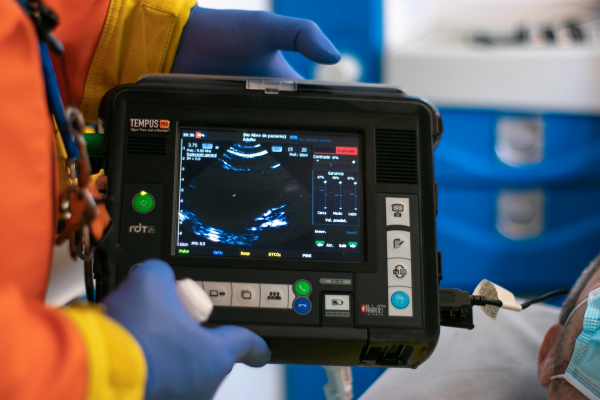
In its first version, Tempus Pro was designed as a telemedicine device for commercial airlines. It has been further supported by ESA to become a dual-use, lightweight, all-in-one monitor with telemedicine capabilities for healthcare professionals.
The two Tempus devices currently on loan to Catalonia’s emergency medical service Sistema d’Emergències Mèdiques (SEM), are used by doctors at ESA’s European Astronaut Centre (EAC) to assess and communicate the condition of astronauts when they return to Earth. They are already being praised for simplicity and connectivity by emergency responders in Barcelona.
Increased care through remote expertise
Spain is one of the countries hardest hit by the current COVID-19 pandemic. At the time of writing, 47 755 cases of coronavirus had been recorded in Catalonia alone, putting additional pressure on emergency teams.
ESA flight surgeon Sergi Vaquer Araujo and medical projects engineer Roger Huerta Lluch say loaning the devices to SEM for the duration of the COVID-19 response was an easy decision. After a successful training, carried out remotely from ESA’s European Astronaut Centre in Cologne, Germany, they are pleased to see Tempus Pro in action where it is needed most.
“The two Tempus devices have been deployed in what are known as intermediate ambulances,” Sergi explains. “Each of these ambulances is staffed by a nurse and a paramedic who receive medical support from an intensive care specialist remotely. The addition of Tempus enables these teams to take care of the most severe patients and deliver a higher level of care without having to have a doctor there.”
This is supported by ESA instrumentation engineer Arnaud Runge who supervised the development of Tempus Pro by UK-based Remote Diagnostic Technologies (RDT) under ESA’s Business Applications programme.
“RDT has reported an increase of orders throughout the COVID-19 crisis with many citing the ability to deliver senior expertise remotely, without doctors being limited to one vehicle or directly exposed to the COVID-19 environment, as instrumental in their response. Space is proving again its importance in our daily life” he adds.
Tempus Pro in action
Registered nurse specialising in emergency and critical care Borja Violant Gomez is part of the SEM team now working with Tempus in Barcelona. For him, its benefits are threefold: simplicity, operability and connectivity.

“We always say that in emergencies, the small details can make the biggest difference,” Borja says. “Performing a tracheal intubation in a surgery room is very different to carrying out the same procedure in a crashed car with a trapped victim, for example. Any simplification and reduction in the weight in size of essential medical equipment allows for better care in hostile environments.”
Borja also commends the device’s intuitive interface, as easy to learn and operate: “our daily work often involves buying time until we can get a diagnosis and treatment. Due to the critical nature of our patients, any time we can save increases a patient’s chance of survival. In the case of a heart attack, an early and clear electrocardiogram is essential to providing the best care and Tempus allows us to do this.”
A truly European effort
The Tempus Pro devices are on loan to SEM for an initial three-month period, during which time they will be evaluated by the emergency medical service’s professional team.
Though the current need was not deemed as urgent as in Spain, ESA is also exploring the potential for Tempus Pro devices to be used in Cologne, Germany – home to the European Astronaut Centre.
It is an action supported by the city’s vice mayor Ralf Heinen who says, “In these difficult times, any support through medical equipment is valuable. I am therefore pleased that the EAC was able to help our twin city Barcelona, which was particularly hard hit by the Corona pandemic. This is the very best of European solidarity in action."
Space on COVID-19
Space based services / applications addressing COVID-19 outbreak
Portal for information about the Open Call for Proposals "Space based services / applications addressing COVID-19 outbreak"
A-Insinöörit Rakennuttaminen Oy
Bertel Jungin aukio 9
FI-02600 Espoo
Finland
Satellite image processing gives sight to visually impaired
A collaboration between British AI company GiveVision and Austrian company Catalysts has resulted in life-changing improvements to headset technology for visually impaired people, thanks to image processing technology used on ESA space projects including Sentinel-3.
Hundreds of visually impaired people in the UK are now able to see clearly again using augmented reality headsets, thanks to expertise gained through high performance processing of satellite imagery. The latest headsets from GiveVision were significantly enhanced thanks to an introduction to Austrian company Catalysts made through ESA Space Solutions network.
Catalysts, which is now part of IT service company Cloudflight, has worked on several ESA space projects including Sentinel-3. The skills and knowledge it shared with GiveVision resulted in a new version of its low vision aids that has been described by users as “amazing” and “life-changing”.

Maisy lost most of her vision around six years ago due to a brain tumour. At the Hay Festival in the UK, she was given the opportunity to use the SightPlus headset for the first time in front of a live audience during an interview with the BBC.
SightPlus enables people who have lost the central portion of their vision, due to conditions such as macular degeneration or diabetic retinopathy, to see in near real time. It does this by processing incoming images and projecting the augmented feed onto the working part of their retinas. The solution, which can be adjusted by the user, works at multiple focal lengths and replaces magnifier-style options that only work at close distances. It also works for people with conditions affecting the whole visual field, including albinism and optic neuritis.
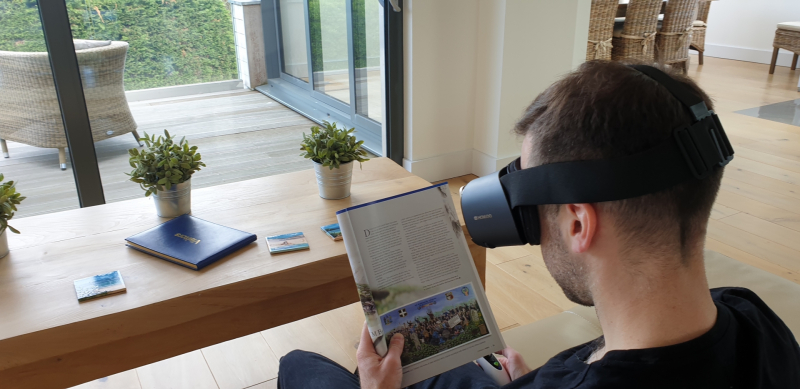
Turning functional into usable
By early 2018, the team at GiveVision had developed a fully working version of its augmented reality headset, based on a smartphone. The next stage was to reduce both the processing time and the load on the processor, in order to significantly reduce lag and heat output and increase the battery life.
It was at this point that GiveVision was introduced to Catalysts through ESA’s Technology Broker Network in the UK and Austria, as part of the ESA Space Solutions network.
“GiveVision had a very clear technical challenge that they wanted to overcome,” says Helen Rogerson from the Science and Technology Facilities Council, ESA Space Solutions UK broker. “That’s exactly what we aim to help resolve with the ESA Technology Broker Network. I directed them to ESA’s Space Solutions portfolio where they identified a technology offering what they needed. Our Austrian broker Brimatech then put them in touch with Catalysts.”
“The broker involvement at this stage was critical,” explains Stan Karpenko, GiveVision’s CEO.
“Our users need to receive the augmented video feed as if they’re looking at it with their own eyes, so there needs to be no lag. We were struggling to do this and to reduce the load on the smartphone’s chips. Catalysts, who we found through the Space Solutions programme, optimised the code so well that we now run our advanced vision processing algorithms at a fraction of the speed.”
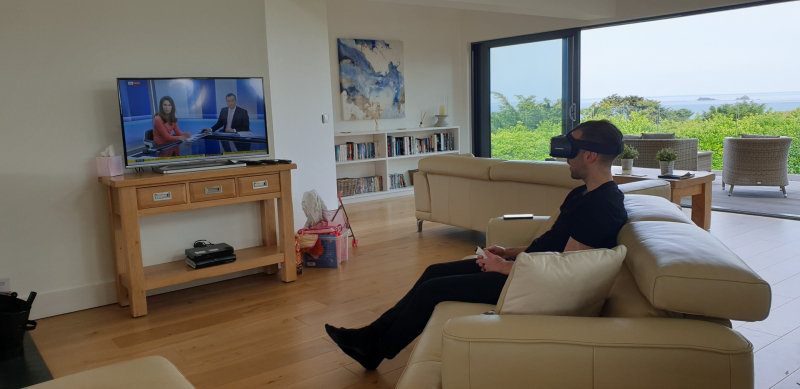
From space to sight
The development by Catalysts was funded by ESA’s Technology Transfer and Patent Office through its proof of concepts call.
“We analysed and optimised the core algorithms using know-how taken directly from our work on space projects, including the CAWA project,” notes Alessio Montuoro at Catalysts.
CAWA is the Advanced Clouds, Aerosols and Water Vapour Products for Sentinel-3/OCLI. Led by Catalysts, the CAWA consortium is developing and improving algorithms related to atmospheric measurements. The company’s skills and know-how relating to high performance image processing are also used in Earth observation (EO) projects covering crop and wetland monitoring.
“With something like SightPlus, a high number of frames per second gives the image smoothness, low latency helps avoid nausea, and consistency in processing removes variability in the image quality,” explains Montuoro.
“Despite the relatively short project time, we managed to reduce the image processing times from 250-450ms per image to around 50ms, which is far more usable. Our work also cut down the heat that’s generated, which makes the headset more comfortable to wear, and has extended the battery life.”
Providing privacy and independence
Over 400 people in the UK are now living with the enhanced SightPlus device. People using earlier versions can now see more, and see it more clearly. Others for whom the original version was too weak can now use SightPlus: this will benefit many potential users whose sight will continue to degenerate, because the upgraded version will provide a solution for longer.
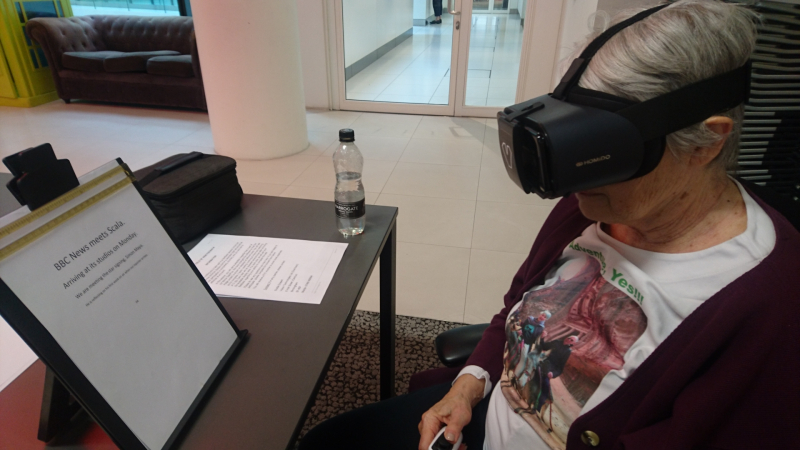
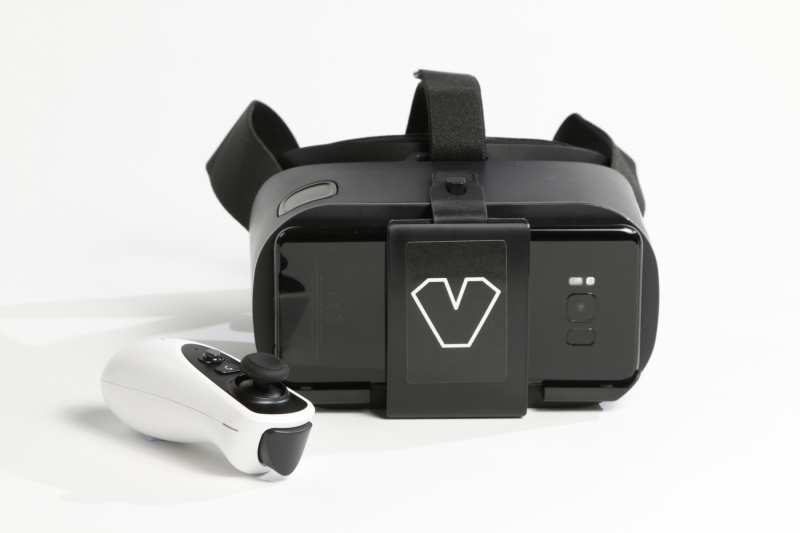
Globally, there are over 191 million people suffering from moderate and severe untreatable sight loss. The substantial performance enhancements from Catalysts’ work will support GiveVision’s aim of developing a headset that looks as close as possible to a pair of spectacles, rather than being based on a smartphone. This design approach augments the natural field of view without blocking any peripheral vision, and will be lighter and more comfortable; all of which should help to significantly increase the rate of user adoption of SightPlus.
About the Technology Transfer and Patent Office
The TTPO's funding for demonstration activities aim at proving the relevance of transferring a given technology or know-how into the non-space context, reducing the technical risk and confirming the market opportunity. An annual open call invites the submission of proposals from industry for Feasibility Studies, Proof of Concepts and Demonstrators. These have been designed as a funnel of activities, de-risking the activities on a step-by-step basis. Please see here for more information.
About ESA Space Solutions
ESA Space Solutions is the go-to-place for great business ideas involving space in all areas of society and economy. Our mission is to support entrepreneurs in Europe in the development of business using satellite applications and space technology to improve everyday life. Funding typically ranges from 50KEuro to 2MEuro and supports everything from early stage incubation programs, feasibility studies to large-scale demonstration projects.
OroraTech launches commercial wildfire detection system
Hot on the heels of the worst bushfires in Australia for a decade, ESA BIC Bavaria alumnus OroraTech has launched a new wildfire management tool using global satellite data, enabling fires to be identified remotely and fire management teams to react quickly.

The 2019 bushfire season in South Australia was the most devastating in the last decade. Not only were animal populations and their ecosystems destroyed in the fires, but the air quality and local weather conditions were greatly altered, including a sharp rise in CO2 levels. The Government scrambled to make decisions when it came to fire management and exhausted first responder resources, incurring millions of dollars of extra costs.
One potential aid for the future – in Australia and elsewhere – has been launched by Munich start-up OroraTech. Founded in 2018, the company specialises in early wildfire detection and monitoring from space using existing satellite data and advanced wildfire algorithms.
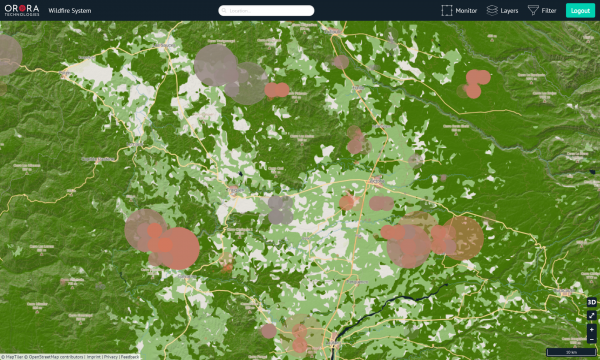
OroraTech recently released the first early access version of its wildfire monitoring system that provides notifications of potential wildfires in a user’s area. Features include visualisation of a fire's propagation, satellite overpass projections and tools for scientific hotspot analysis. The system also provides numerous map layers, such as fire danger and fuel maps that are updated daily to incorporate the latest weather forecast.
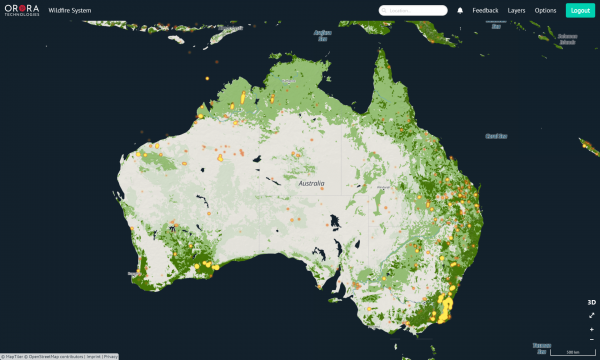
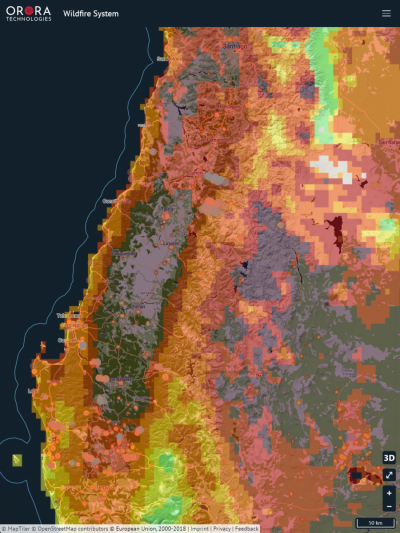
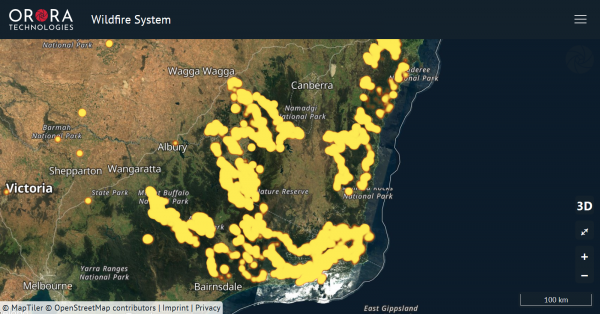
Global satellite data fuels all-in-one fire management tool
OroraTech's wildfire system stands out from its competitors by combining a large amount of data from several satellites, including ones from ESA, NASA, the National Oceanic and Atmospheric Administration (NOAA) and EUMETCast, and through the subsequent analysis and presentation.
The vision behind the system's creation was to help reduce CO2 emissions, conserve nature, and protect lives and infrastructure.
OroraTech's customers in forest services and commercial forestry have confirmed the system offers a faster update rate that has helped them spot fires remotely.
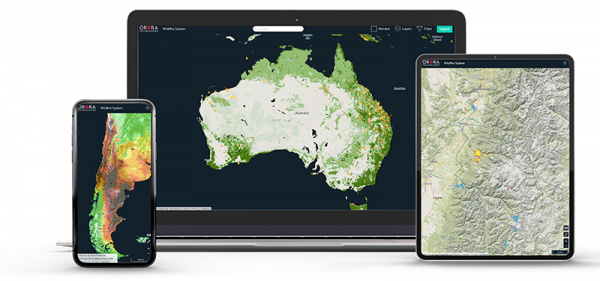
“We are making a real difference in the rising global wildfire challenges with an all-in-one system that enables the fastest detection of wildfires on a global scale,” said OroraTech Lead Engineer and Co-founder Rupert Amann.
'Eyes in the sky' set to replace 'boots on the ground'
With the effects of rising temperatures and longer dry seasons, wildfires are likely to become larger and burn longer in areas that do not have the capacity to maintain an early fire management and execution plan. This means fire management developers are searching for alternative resources for early detection, rather than only relying on watchtowers and boots on the ground.
The satellite images in the OroraTech system, provided by the Copernicus Programme, enable users to monitor fires from a different perspective.
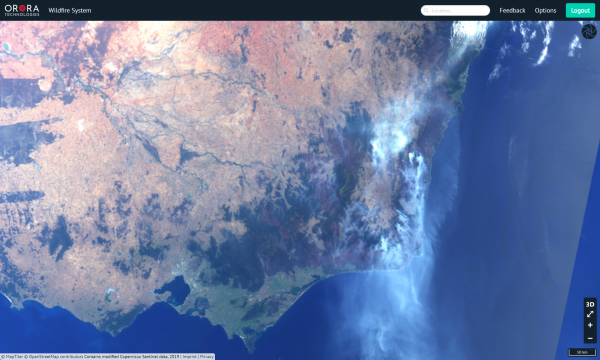
Multiple satellite sources provide the extensive data for the wildfire system, allowing customers to react before a fire becomes uncontrollable. The data is quickly processed through a cloud-based processing framework and is then accessible through a wildfire API and an innovative web-based interface. This combination results in a system that offers customers and researchers an advanced tool for fire analytics.
The OroraTech system with all premium features is currently available for a free trial period, accessible at OroraTech.
ESA BIC Bavaria
ESA Business Incubation Centre (BIC) in Bavaria promotes companies with disruptive products and digital businesses in areas like robotics, mobile, mobility, automotive, aviation and satellites. Since 2004, ESA BIC Bavaria, managed by Anwendungszentrum GmbH Oberpfaffenhofen (AZO), has supported more than 165 start-ups with an annual turnover of around €150 million (2018), creating more than 2,800 high-tech jobs in Bavaria and attracting over €50 million in venture capital (2018). For more information, see www.esa-bic.de.




